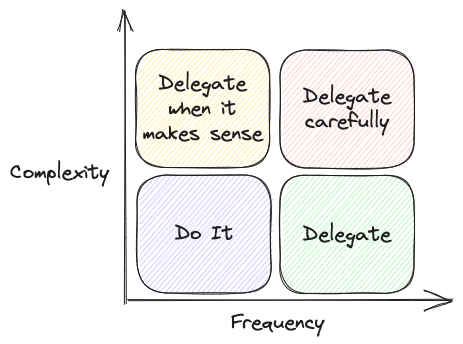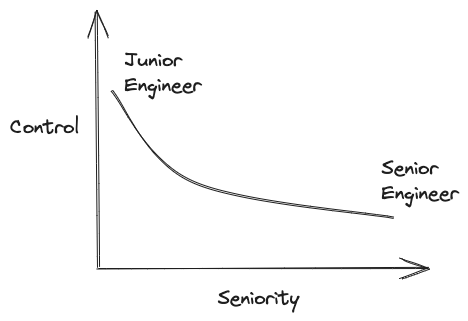Have you ever felt overwhelmed by the amount of work? As managers, we frequently get requests from different sources, and if we don’t delegate, we end up overloaded, working extra hours, and, worse, burned out. If this situation sounds familiar, this article can be helpful.
The goal of a software engineer is to solve problems cost-efficiently. Most of the time, the solution involves writing some code and delegating the work to a machine. Being an effective manager means learning to delegate work to people to create a more engaged and efficient team.
First, we must understand the difference between accountability and responsibility in order to delegate effectively. These words are usually used interchangeably, making the concept harder to understand.
- Accountable: You take ownership of completing the task and the quality outcome.
- Responsible: You are responsible for doing the work to complete the task.
For example, suppose a new feature is requested to support a new currency in the payment system. In that case, the engineering manager is accountable for delivering the feature, and the engineers are responsible for implementing, testing, and shipping it to production. If things go wrong, the fault falls on the person accountable.
It sounds easy! But should we delegate every single task?
How do we know when to delegate?
To understand when we should delegate, we need to take into consideration two dimensions:
- Frequency: How often do we perform the task?
- Complexity: How complex is the task?

Simple & Frequent - Delegate
If a task is simple and shows up frequently, then delegate it. Delegating frequent tasks can give you much free time and help develop your team. It is an excellent opportunity to coach your direct reports and help them be more autonomous. Next time the same task comes up, you can delegate it and get some free time to focus on other things.
Simple & Infrequent - Do it
When a task is simple and infrequent, it’s the perfect example that we shouldn’t delegate every task but instead do it ourselves. We should protect the engineers and minimise their context switch. Also, there is a small benefit of teaching people to complete a task if, by the next time, they won’t remember.
Complex & Frequent - Delegate Carefully
In this scenario, where the work is complex and frequent, we should delegate it but have a high sense of risk. Like the first scenario, it is an ideal opportunity to develop and stretch your team while addressing business needs. Spend time coaching the person responsible, give them feedback and review the work to ensure it meets the expected quality. In the end, you are accountable for the outcome of your team.
Complex & Infrequent - Delegate when it makes sense
Of all the situations, this is the trickiest scenario. Why should we delegate an infrequent complex task? We can use the same arguments as in the “do it”. However, do we want to spend a fair amount of time dealing with this complex task? Well maybe. There is no correct answer for this case. I recommend understanding if someone in your team aspires to a career path that aligns with the task. For example, if someone wants to be a manager and the task is relevant to the role, it makes sense to challenge that person and prepare them for the future. If it’s not the case, book some time in your calendar and do it yourself.
Level of delegation
When delegating a task, we need to take into consideration what is the seniority of the individual who is responsible for completing the task. We want to ensure that all work is complete with excellent quality and low control from our side.

Looking at the graph, we can see that the more junior, the more control from our side is needed. Control means we must coach the person and review their work to ensure the task is complete with the expected quality. Yet, you should trust and empower them to make decisions. That’s the only way they can feel stretched and grow. Create a safe space for failure where they can learn from it.
Delegation Do’s and Don’ts
Do
- Delegate effectively by considering the frequency/complexity matrix and delegation level. Remember, you are the person accountable for delivering.
- Create a safe environment where your team can make decisions and take risks to help them grow.
- Set clear expectations and communicate clearly what the outcome must be to avoid surprises.
- Spend time coaching and developing your team, give constructive feedback and support them in doing the best work.
- Delegate work by matching their career ambition and personal goals. Help your team reach the next level.
Don’t
- Don’t blame your team if things go wrong. You are accountable for their outcome.
- Don’t ignore your team if they need your support completing the work.
- Don’t micromanage, which can undermine their confidence and autonomy.
- Don’t take the credit from your team, which is doing the work.
To summarise, delegating is a great way to coach and develop your team. You have more free time to focus on different things, and your team learns new skills and becomes more autonomous, confident and valuable in performing their jobs. It’s crucial to understand that the benefits of coaching our direct reports compound over time. Next time the same person needs to perform a similar task, it will require less control, and at some point, that person will be entirely independent and help others, which is a sign of a high-performing team.